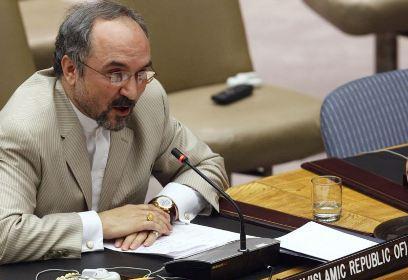All options on table if IR Iran under serious threat: Khazaei

 All options will be on the table if Tehran becomes under serious threat, Iran’s Ambassador to the UN Mohammad Khazaei said here on Thursday.
All options will be on the table if Tehran becomes under serious threat, Iran’s Ambassador to the UN Mohammad Khazaei said here on Thursday.
In an interview with the Charlie Rose program on the American PBS television channel, Khazaei reiterated that Iran’s strategy is to maintain peace in the Persian Gulf.
‘Our strategy… is not confrontation with any country, and as far as the Strait of Hormuz… is concerned, we believe that the Strait of Hormuz should be the strait of peace and stability,’ he said.
The Iranian envoy went on to say that Iran has always worked closely with the neighboring countries to maintain peace in the region.
‘There is no decision to block and close the Strait of Hormuz,’ Khazaei announced, noting that any such move would only be made in the case of a serious threat against Iran.
He further explained that regional countries reserve the right to defend themselves against any foreign interference.
The Iranian envoy to the UN also pointed out that Tehran has no objection to inspections of its nuclear facilities within the framework of the Non-Proliferation Treaty (NPT).
Khazaee said Iran was moving its enrichment process to more secure facilities, because of the possible threats that Iran might face from the US and the Zionist regime.
‘It doesn’t mean that we are intending to do something illegal,’ he said. Iranians ‘do not intend, and did not intend, and will not intend to have a weaponary program.’
Khazaee said it was unlikely zionist regime would try to bomb Iran’s nuclear facilities.
‘There are enough wise politicians around the world to advise them in case if they want to do that not to do it,’ he said. ‘So therefore, we don’t think that it is going to happen.’
Asked about US recent accusations against Tehran, he responded by saying that ‘there is no evidence proving Iran’s plot to assassinate Saudi ambassador to Washington; this scenario was a plot to demonize Islamic Republic of Iran; Iran would never plot a terrorist operation against a neighboring Muslim country.’
‘Iran’s policy toward Syria unrests lies in Tehran’s support for people’s demands in all regional countries, including Syria, Bahrain, and Yemen; there are some evidence showing some European countries send arm to the rebels in Syria; Syrian government and nation can solve their problems themselves; Iran welcomes the ongoing Islamic Awakening in the region,’ Khazaei continued.
He noted that there is a misconception pertaining US in Iranian nostalgic mind; Washington should try to change Iranians’ view.
The Strait of Hormuz is a narrow waterway which connects the Persian Gulf to the Sea of Oman. Statistically, the waterway is one of the world’s most important shipping lanes, with a daily flow of about 15 million barrels of oil.
The US and European efforts to tighten economic sanctions on Iran to deter its nuclear program have shaken oil markets and prompted concern over the fact that reduction in supply could hurt the global economy.
Chinese Premier Wen Jiabao yesterday in Doha, Qatar said his country completely opposes any ‘extreme’ actions in the Strait of Hormuz that would hurt global interests.
Sanctions and threats against Iran are counterproductive and pose a risk of escalating tensions in the region, Chinese Foreign Ministry spokesman Liu Weimin said recently.
Washington and its Western allies accuse Iran of trying to develop nuclear weapons under the guise of a civilian nuclear program, while they have never presented any corroborative evidence to substantiate their allegations. Iran denies the charges and insists that its nuclear program is merely for peaceful means.
Furthermore, The Islamic Awakening is a revolutionary wave of demonstrations and protests occurring in the Muslim world. Since 18 December 2010, there have been revolutions in Tunisia, Egypt, Bahrain and Yemen; a civil war in Libya resulting in the fall of its regime; major protests in occupied Palestine against the Zionist regime, Algeria, Jordan, Morocco and Oman, and minor protests in Kuwait, Mauritania, Saudi Arabia and Western Sahara.
Syria has been experiencing unrest since mid-March with organized attacks by well-armed U.S, zionist israel- backed gangs against Syrian police forces and border guards being reported across the country.
Hundreds of people, including members of the security forces, have been killed, when some protest rallies turned into armed clashes.
In October, calm was eventually restored to Syira after President Bashar al-Assad started a reform initiative in the country, but plots by the US and the zionist regime could spark some new unrests in certain parts of the country.







